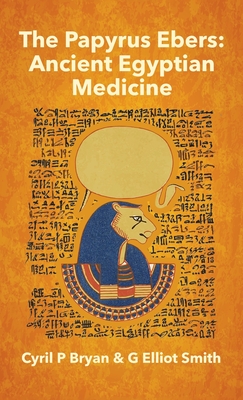Papyrus Ebers: Ancient Egyptian Medicine by Cyril P Bryan and G Elliot Smith Hardcover

Papyrus Ebers: Ancient Egyptian Medicine by Cyril P Bryan and G Elliot Smith Hardcover
The Ebers Papyrus, also known as Papyrus Ebers, is an Egyptian medical papyrus of herbal knowledge dating to circa 1550 BC. Among the oldest and most important medical papyri of ancient Egypt, it was purchased at Luxor in the winter of 1873-74 by Georg Ebers. It is currently kept at the library of the University of Leipzig, in Germany. The Ebers Papyrus is written in hieratic Egyptian writing and represents the most extensive and best-preserved record of ancient Egyptian medicine known. The scroll contains some 700 magical formulas and folk remedies. It contains many incantations meant to turn away disease-causing demons and there is also evidence of a long tradition of empiricism. The papyrus contains a "treatise on the heart". It notes that the heart is the center of the blood supply, with vessels attached for every member of the body. Mental disorders are detailed in a chapter of the papyrus called the Book of Hearts. Disorders such as depression and dementia are covered. The descriptions of these disorders suggest that Egyptians conceived of mental and physical diseases in much the same way. The papyrus contains chapters on contraception, diagnosis of pregnancy and other gynecological matters, intestinal disease and parasites, eye and skin problems, dentistry and the surgical treatment of abscesses and tumors, bone-setting and burns. The "channel theory" was prevalent at the time of writing of the Ebers papyrus; it suggested that unimpeded flow of bodily fluids is a prerequisite for good health. It may be a considered a precursor of ancient Greek humoral pathology and the subsequently established theory of the four humors, providing a historical connection between Ancient Egypt, ancient Greece, and medieval medicine.
PRP: 217.00 Lei
Acesta este Prețul Recomandat de Producător. Prețul de vânzare al produsului este afișat mai jos.
195.30Lei
195.30Lei
217.00 LeiLivrare in 2-4 saptamani
Descrierea produsului
The Ebers Papyrus, also known as Papyrus Ebers, is an Egyptian medical papyrus of herbal knowledge dating to circa 1550 BC. Among the oldest and most important medical papyri of ancient Egypt, it was purchased at Luxor in the winter of 1873-74 by Georg Ebers. It is currently kept at the library of the University of Leipzig, in Germany. The Ebers Papyrus is written in hieratic Egyptian writing and represents the most extensive and best-preserved record of ancient Egyptian medicine known. The scroll contains some 700 magical formulas and folk remedies. It contains many incantations meant to turn away disease-causing demons and there is also evidence of a long tradition of empiricism. The papyrus contains a "treatise on the heart". It notes that the heart is the center of the blood supply, with vessels attached for every member of the body. Mental disorders are detailed in a chapter of the papyrus called the Book of Hearts. Disorders such as depression and dementia are covered. The descriptions of these disorders suggest that Egyptians conceived of mental and physical diseases in much the same way. The papyrus contains chapters on contraception, diagnosis of pregnancy and other gynecological matters, intestinal disease and parasites, eye and skin problems, dentistry and the surgical treatment of abscesses and tumors, bone-setting and burns. The "channel theory" was prevalent at the time of writing of the Ebers papyrus; it suggested that unimpeded flow of bodily fluids is a prerequisite for good health. It may be a considered a precursor of ancient Greek humoral pathology and the subsequently established theory of the four humors, providing a historical connection between Ancient Egypt, ancient Greece, and medieval medicine.
Detaliile produsului










